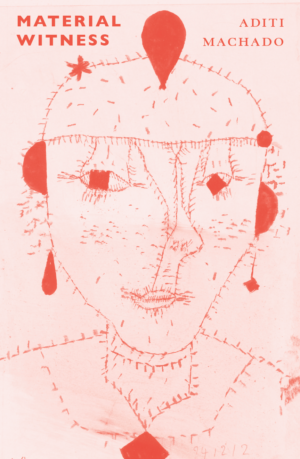In Their Own Words
Aditi Machado on “Material Witness”

from “Material Witness”
Once it had been written ‘Sacred means saturated with being,’ you spoke
that zone into obliteration, lying out of an abundance of caution in
untimely grasses.
You could have had visions, you could have had anything you wanted by
methods of indiscretion increasingly purveyed in those final years
in which lyric was put before all, lyric tea, lyric grant, lyric mass
shooter, give yourself up
except you couldn’t, not to the accountants, not to the heightened
scrutability of the land, heights you’d fall off of.
Then an opaque zone. Or darkness bled. Impossible to extract confessions
when they’re spilling already everywhere.
Then bloodless darkness. Dissent.
Trust nothing. The sun is president.
From Material Witness (Nightboat Books, 2024). Reprinted with the permission of the publisher and poet.
On “Material Witness”
This is the penultimate section of the seventeen-part titular poem that opens my book Material Witness. Though I revised it several times in subsequent years, the poems—or sections of the long poem—were written between November 2019 and October 2021.
Like its twin long poem “NOW” which closes out the book, “Material Witness” addresses—or implicates—you while preventing the expected I of the I-thou relationship from making an appearance. It’s an experiment on the lyric whose preliminary results form a private answer to myself about the nature of power, submission, and sovereignty. But the experiment is ongoing and you, whoever you are, if you care to read the poem, are invited to tell me what you think.
I’ve written many long poems over the years. It’s not ambitious or virtuous to write long poems (sometimes people seem to think it is)—not for me. I think of longform writing in the lyric mode as a thickened experience of the quotidian that’s structurally reinforced by language, language registering the passage of time—“a generous strange series of contortions between / actions and sequences that required // me to move closer to the order of perception which is the / book’s order, the fictional order of orders where the time of / sequence rearranged is the present” (Richard Meier, A Duration).
When I was drafting it, “Material Witness” was simply called “Then.” Each section—or poem—would take that name if an editor chose to publish it. In sequence, I had this idea the poems would proceed backwards in time: today, then the day before that, and so on.
It is strange—uneasy in its pertinence—to layer the poem’s record of time from so many years ago to the present time of re-reading it. The penultimate section breaks out of the past tense to say, “Trust nothing” and “The sun is president.” I like to think that “is” is the “is” of “Dissent.”



